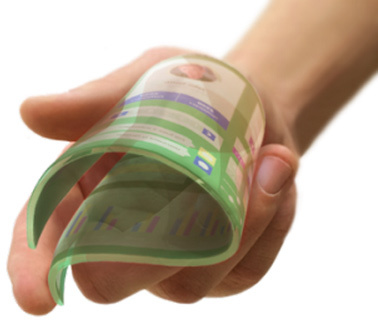A film with “nanopouches” turns almost any surface into a touchscreen
 Finnish startup Canatu has developed a flexible, electrically conductive touchscreen film, which can lead to the emergence of fundamentally new mobile gadgets of arbitrary shape.
Finnish startup Canatu has developed a flexible, electrically conductive touchscreen film, which can lead to the emergence of fundamentally new mobile gadgets of arbitrary shape.Imagine your smartphone bending and folding like a sheet of paper. If you make a screen out of such a film, then designers will open a huge field for the realization of the most crazy ideas.
You can attach a touchscreen on various elements of a curved shape. For example, on the dashboard of a car or on the handlebars, or on the wire from the headphones. This is how new management interfaces are implemented. Commands are given by touching the wire or the steering wheel.
')
Moreover, such material, for example, is sewn into clothing or wound directly on the wrist. That is, the touchscreen is literally worn on the body.
Conventional touchscreens are made from transparent sheets of indium tin oxide (ITO). But this semiconductor material can be applied only on a flat surface, besides the sheets are very fragile and easily damaged.
 Canatu films of various types are made with a coating of so-called carbon “nano-pouches” (Carbon NanoBud is a registered trademark of Canatu). They are depicted in the illustration. These structures more stably conduct an electrical signal than carbon nanotubes. Researchers managed to improve the quality of electrical contacts by changing the shape of the "pimples". The resulting film is stretched to 200% of its area. This is a much better indicator than other flexible touchscreens that stretch by no more than a few percent.
Canatu films of various types are made with a coating of so-called carbon “nano-pouches” (Carbon NanoBud is a registered trademark of Canatu). They are depicted in the illustration. These structures more stably conduct an electrical signal than carbon nanotubes. Researchers managed to improve the quality of electrical contacts by changing the shape of the "pimples". The resulting film is stretched to 200% of its area. This is a much better indicator than other flexible touchscreens that stretch by no more than a few percent.The process takes place in one stage, which involves the deposition of carbon-containing gas on the surface of the film with the simultaneous formation of nanostructures of the desired shape. True, the electrical conductivity of the touchscreen is not high enough to cover very large areas.
Canatu is currently working on 40 prototypes of different films, each of which is designed for its own use, including to cover the screens of smartphones, smart watches or more extensive surfaces, like a car dashboard.
The founders of Canatu are confident that the flexible displays are the future, and they will become mainstream within 2-5 years. The company expects next year to reach production capacity sufficient to produce touchscreens to millions of smartphones per month.
via Technology Review
Source: https://habr.com/ru/post/364057/
All Articles